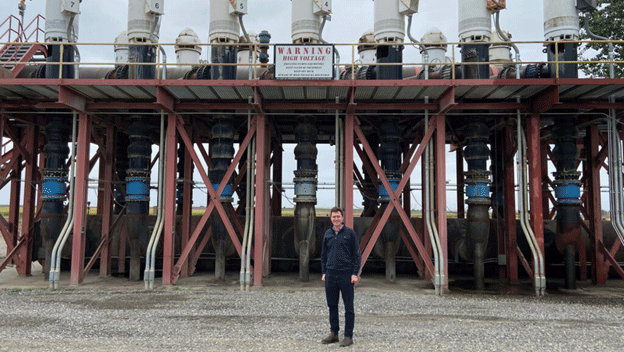The UK potato sector is facing one of its most challenging periods. With extremely low margins, reduced capital returns, and an increasingly restricted market, growers are finding it harder to remain profitable. Coupled with unpredictable weather patterns, rising disease pressures, and growing input costs, many farmers are leaving potato production altogether.
However, Norfolk grower Harry Barnett, who manages 400 hectares at Holkham Estate, sought to counter this negativity by undertaking a Nuffield scholarship, sponsored by McDonald’s and the Royal Norfolk Agricultural Association. Harry’s travels across Europe and North America offered key lessons for the UK potato sector, showing ways to adapt, innovate, and thrive despite growing pressures.
Global Insights: Learning From Europe and North America
1. Water Management
Water management emerged as one of the key takeaways from Harry’s scholarship. In countries like the Netherlands and France, growers are faced with both water scarcity and overabundance, creating a delicate balance for consistent yields.
Harry noted that UK farmers often view their climate as too challenging, yet countries in Africa and North America face far harsher conditions. To succeed, UK growers must optimize their water infrastructure. Harry advocates for investments in:
- Water capture systems to store surplus rainfall.
- Healthy soil structure to improve infiltration.
- Drainage infrastructure to prevent waterlogging and improve adaptability.
Adopting advanced water management technologies will allow UK farmers to mitigate the impacts of extreme weather, which is becoming increasingly unpredictable.
2. Innovations in Breeding
Traditionally, potato breeding programs prioritized yields over disease resistance. However, the tide is changing. During visits to breeding facilities, Harry saw a renewed focus on developing varieties with stronger agronomic traits to reduce input dependency and improve resilience.
Recent studies show that advanced breeding techniques can help farmers:
- Reduce reliance on chemical inputs.
- Improve crop resistance to pathogens like late blight and black scurf.
- Increase sustainability without compromising yield potential.
Harry emphasized the importance of leveraging these developments, stating: “Strong plant genetics are essential for meeting both agronomic and environmental targets while remaining competitive.”
3. Market Adaptation and Infrastructure Investment
European growers have embraced market trends, particularly by focusing on processing varieties like french fries, where demand is consistently strong. The UK currently imports close to 1 million tonnes of frozen potato products annually, primarily from Europe—revealing an opportunity for local producers.
Small family farms in Europe, Harry observed, achieve good margins by focusing on niche markets and investing in infrastructure to add value to their produce.
For UK farmers, Harry recommends:
- Targeting market niches such as salad potatoes, processing varieties, or specialty products.
- Investing in modern infrastructure and technology to improve efficiency and meet consumer expectations.
Growers who align their production systems with consumer and market demands stand to reclaim value from imports and reinvest in their businesses.
4. Consumer Demand: Revaluing the Potato
Despite challenges, the potato remains a staple in Western diets, with strong growth in global markets. In regions like North America, large-scale farms are built around meeting this massive demand through efficient systems—although Harry raised concerns about high chemical and water inputs in these operations.
In the UK, consumer support will be critical to ensuring the industry’s survival. Harry believes that sustainable, locally-produced potatoes must be recognized and valued for their nutritional and environmental benefits.
He argues: “Consumers must either pay more at retail shelves for environmentally friendly food or support farmers through government-backed strategies to ensure long-term food security.”
A Way Forward for UK Potato Growers
Harry Barnett’s global research demonstrates that the UK potato sector, despite its challenges, has significant potential for revival. By prioritizing water management, adopting disease-resistant varieties, focusing on market niches, and engaging with consumer demand, UK growers can ensure the crop remains both profitable and sustainable.
Ultimately, the potato—often perceived as “unfit” for regenerative systems—remains one of the most carbon-efficient and nutritious carbohydrates available. With strategic investments and a shift in mindset, the UK potato sector can adapt, innovate, and thrive in a rapidly changing global market.







